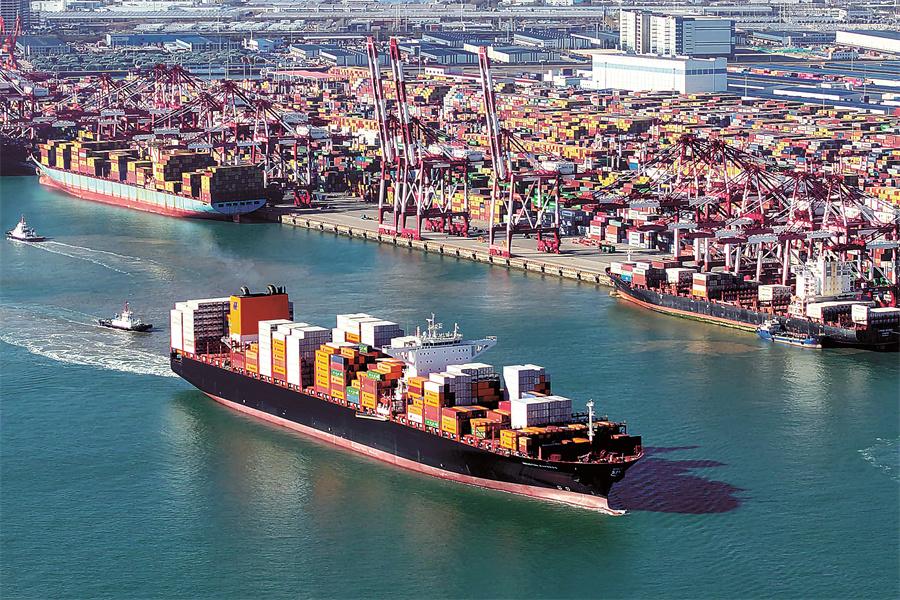
A container ship leaves Qingdao Port, Shandong province. [YU FANGPING/FOR CHINA DAILY]
China will continue to advance institutionalized opening-up, broaden market access for global businesses and advocate free trade agreements, fueling its economic growth and bolstering multilateralism in 2025, market observers and business executives said on Sunday.
Despite challenges from protectionism and anti-globalization trends, these moves will help China solidify its position as a global manufacturing and innovation hub while attracting more foreign capital, they said.
By securing more favorable trade terms and enhancing its role in global trade, the country will further integrate into the global economy, they added.
Their comments followed the annual Central Economic Work Conference held in Beijing last week, during which Xi Jinping, general secretary of the Communist Party of China Central Committee, delivered an important speech.
The meeting emphasized that China should expand its high-standard opening-up and keep foreign trade and foreign investment stable. Efforts should be made to expand all pilot opening-up programs in fields such as telecommunications, healthcare and education, it said.
Liu Xiangdong, deputy head of the China Center for International Economic Exchanges' economic research department, said these decisions indicate that China's investment and foreign trade environment will become more predictable and stable in the coming years.
Noting that China gave the green light earlier this year for the establishment of wholly foreign-owned hospitals in selected cities, including Beijing and Shanghai, Liu said that expanding global businesses' access to more sectors will further diversify the nation's economy, reduce reliance on traditional industries and boost the growth of sectors such as high-end manufacturing, modern services and green and digital technologies.
Wang Jinbin, a professor at the School of Economics at Renmin University of China in Beijing, said that with a new administration ready to take office in the United States next month, it is practical for China to focus on critical technologies and enhance the resilience and security of industrial and supply chains to boost global competitiveness and stabilize international markets.
Wei Jianguo, former vice-minister of commerce, shared similar views. "Promoting and joining various multilateral and bilateral free trade deals, such as the Regional Comprehensive Economic Partnership and the Comprehensive and Progressive Agreement for Trans-Pacific Partnership, are crucial for China to sustain its foreign trade growth," he said.
These initiatives, including the RCEP and CPTPP, could assist China in countering the pressures of unilateralism by offering a platform for countries to collectively shape international trade rules and standards, Wei said, predicting that the new growth engines of China's foreign trade are likely to come from emerging economies next year.
China's foreign trade grew 4.9 percent year-on-year to 39.79 trillion yuan ($5.5 trillion) in the January-November period, while exports increased 6.7 percent on a yearly basis to 23.04 trillion yuan, statistics from the General Administration of Customs showed.
To mitigate the risks caused by geopolitical tensions, as well as unilateral and protectionist moves, Lixun Precision Components (Suzhou) Co, an electronic components manufacturer in Suzhou, Jiangsu province, has begun expanding into markets involved in the Belt and Road Initiative.
"With many parts of the world seeking ways to pursue economic recovery, tackle inflation and create jobs, implementing protectionist measures can only generate negative impacts on businesses," said Zhou Huagang, the company's head of customs affairs.
The company's foreign trade value with countries participating in the BRI reached $64.28 million between January and October, surging 168 percent year-on-year, data from Nanjing Customs in Jiangsu showed.
Viewing China as crucial to its global business strategy, German chemicals manufacturer Covestro AG is currently building a large factory in Zhuhai, Guangdong province, and plans to direct 75 percent of its investment in the Asia-Pacific region to China over the next three years.
Thomas Roemer, global head of Covestro's coatings and adhesives business entity, said that apart from supplying products to domestic customers, the group also exports chemical materials manufactured in its China plants to other countries such as India, Japan, Vietnam and Indonesia.
"China's stable economic growth, market size and the recent removal of all market access restrictions for foreign investors in the manufacturing sector will keep attracting foreign companies to increase their investments in the country," he added.
Han Wenxiu, executive deputy director of the Office of the Central Committee for Financial and Economic Affairs, said at an economic forum in Beijing on Saturday that China is on track to achieve its anticipated economic and social development targets, registering around 5 percent GDP growth and contributing nearly 30 percent to global economic growth this year.
If you have any problems with this article, please contact us at app@chinadaily.com.cn and we'll immediately get back to you.
更多資訊,下載群眾新聞

